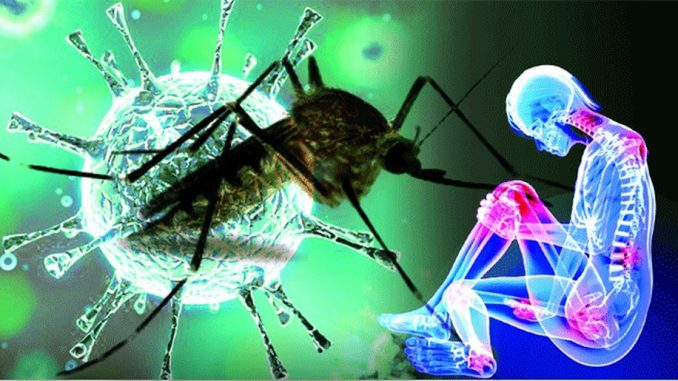
In News
Following decades-long research scientists from the Institute of Life Sciences (ILS) have developed antibodies against Chikungunya infection.
In-Detail
- ILS which functions under the Department of Biotechnology has developed antibodies against Chikungunya viral (CHIKV) infection.
- It has entered into a non-exclusive license with a biotechnology-based company for product commercialization and marketing in a 60:40 profit sharing basis.
The Research
- The research was carried out by Dr. Soma Chattopadhyay at ILS.
- A molecular virologist, Dr. Chattopadhyay has been selected by the Department of Biotechnology for the Biotech Product, Process Development and Commercialisation Award 2019.
- The decades of research by her group has yielded the development of antibodies against CHIKV for the first time.
- They have developed a novel, highly sensitive and specific polyclonal antibodies against the non-structural proteins – nsP1, nsP3, and nsP4 of CHIKV.
- They have also developed a monoclonal antibody against nsP2 of CHIKV.
- The research group has targeted these proteins in the virus as they govern the survival of the virus by controlling the replication and infection in the host cells.
- The development is significant as it will help researchers who are working on CHIKV infection to understand the various aspects of virus pathogenesis.
- ThIt will also pave the way for the development of antiviral drugs and control strategies against the infection.
- As per ILS, the antibodies are in full demand and are being purchased by research laboratories across the world.
Some Facts
- Chikungunya is transmitted to humans by infected mosquitoes, especially through Aedes aegypti and Aedes albopictus species of mosquitoes.
- The disease leads to high fever and joint pains.
- Symptoms of the disease appear 4 to 7 days after
a mosquito bite. They include
- High fever
- Joint pain
- Joint swelling
- Rash
- Headache
- Muscle pain
- Nausea
- Fatigue
- The disease is rarely fatal with only a few cases of mortality reported.
- But, the joint pains last for a very long time even after the viral load is reduced from the body.
- In India, Chikungunya outbreak occurs during the monsoon season as mosquitoes breed in large number.
Conclusion
According to the National Health Profile (NHP) 2017, India witnessed a sharp rise in the number of Chikungunya cases from 2013. From 18,840 in 2013 it had increased to 63,679 in 2017. The burden of the diseases is increasing year-on-year in the country. With more heat stress associated with rising temperatures, CHIKV infections are expected to increase further. India will be witness economic loss in the form of morbidity of its working population.
So far no major pharmaceutical company has seriously undertaken research for developing antiviral drugs for the disease. As Chikungunya is a neglected tropical disease the Big Pharma is disinterested as no major European country or America are facing severe threat from CHIKV infection.
Thus the research and development of antibodies for CHIKV from India is expected to give an impetus to the development of potential drugs against the infection in the near future.
- Buruli ulcer
- Chagas disease
- Cysticercosis
- Dengue and Chikungunya fever
- Dracunculiasis (Guinea Worm Disease)
- Echinococcosis
- Fascioliasis
- Human African Trypanosomiasis (African Sleeping Sickness)
- Leishmaniasis
- Leprosy (Hansen’s disease)
- Lymphatic filariasis
- Onchocerciasis
- Rabies
- Schistosomiasis
- Soil-transmitted Helminths (STH) (Ascaris, hookworm, and whipworm)
- Trachoma
- YawsExternal

Leave a Reply
You must be logged in to post a comment.